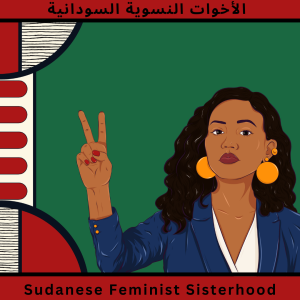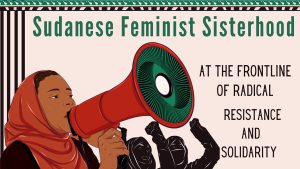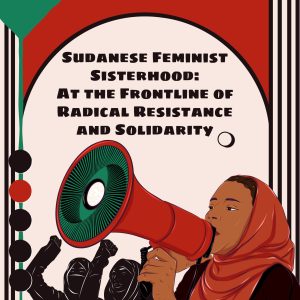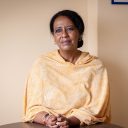In loving memory of Roya Hassan and Ahmad Sibar, our comrade activists, friends, and siblings, whose absent presence will linger around, reminding us of their power and all the battles they won for women and girls. We shall always remember Roya as a true beacon of hope and resilience; her writings will never cease being an integral part of the Sudanese literature on feminism. We are also in awe of all the times Ahmed, the lawyer, the human rights activist, was there for every woman in Sudan…
While disproportionately impacted by the crisis in Sudan, Sudanese feminist activists are the foundation of the resistance and at the frontlines of emergency response.
Sudan has endured a series of interconnected crises, intricately intertwined with a legacy of colonialism and imperialism that is deeply embedded in the country’s current context. The arbitrary borders, ethnic divisions, economic exploitation and domination, marginalization, and authoritarian and proxy governance have collectively fueled the challenges Sudan faces.
 The political landscape in Sudan today is the result of many years of violence, unfolding in rapid and complex realities for Sudanese people, especially women and girls who are the most vulnerable during the current bloody power struggle. Women and girls have been subjected to gender-based violence, including rape, while facing severe structural barriers in reporting and documenting cases of abuse and assault. The situation has been exacerbated by the drastic decrease in access to basic needs such as food, water, and protection, leaving Sudanese in dire conditions.
The political landscape in Sudan today is the result of many years of violence, unfolding in rapid and complex realities for Sudanese people, especially women and girls who are the most vulnerable during the current bloody power struggle. Women and girls have been subjected to gender-based violence, including rape, while facing severe structural barriers in reporting and documenting cases of abuse and assault. The situation has been exacerbated by the drastic decrease in access to basic needs such as food, water, and protection, leaving Sudanese in dire conditions.
Amidst the ongoing crises, access to crucial medical services and medication remains scarce as the shelling targeted many medical facilities and hospitals that have become damaged or understaffed. This has further deepened the health crisis in the country, leaving many without urgent medical care and attention.
The impact of the war on girls and women has reached alarming levels. In June 2023, the UN human rights office (OHCHR) received credible reports of twelve incidents of conflict-related sexual violence against at least 37 women in Sudan, with at least three incidents involving young girls.
‘We saw from the first few days that sexual violence is used as a weapon of war against women and girls, and there have been incidences of rape in Khartoum and in different parts of Sudan. This is a war on Women.’ – -Reem Abbas
As a result of the war, there are over 24 million people in need of emergency humanitarian support and 3 million have been displaced, including 1 million children. The impact on children has been devastating; over 330 children have been killed, and more than 1,900 children have been injured. The entire country has plunged into economic paralysis, and the banking system has completely collapsed, aggravating the already dire situation.
The epicentre of this conflict may be in Khartoum, but the devastating effects of the war have not spared other regions, especially the Darfur region, where atrocities ranging from ethnic cleansing to sexual violence have been rampant. Women and girls, especially those with multiple identities that face further discrimination, such as disability and migration status, have borne the brunt of the crisis as they face a compounding array of challenges. As a result, many families and individuals are seeking safety in other areas within Sudan or neighboring countries, leaving behind houses, memories, and loved ones. For women and girls who cannot afford to leave, their bodies have been weaponized, threatening their movement, space, decisions, autonomy, and, ultimately, their lives.
‘On my way out of Khartoum, it was quite clear that the city is under the complete domination of the paramilitary, and there was no way for anyone to go in or out of the city without being inspected and terrorized’ -Aya Elzein.
The unfolding crisis in Sudan demands urgent attention and accurate reporting, yet mainstream media is not adequately covering what’s happening in Sudan and is contributing to widespread misinformation. At this moment, a local, contextual, and feminist perspective on the crisis becomes more crucial to shed light on the nuanced realities and to tackle the misinformation that is aggravating the crises.
Sudanese Women at the Forefront of the Humanitarian Response
Sudanese women and girls were the backbone of the revolution in Sudan and the subsequent humanitarian response, demonstrating immense power, resilience, and determination despite being disproportionately impacted by the crises. In the wake of the ongoing war, Sudanese women continue to be at the forefront, resisting and organizing. They have shifted the role of the feminist movement to focus on providing humanitarian response support, in most cases they are the only ones responding. Providing grassroots support in the form of shelter, food, medical and healthcare supplies, psychological support, documenting and monitoring violations and abuse, and serving as a network of mutual aid.
‘Women and girls are the infrastructure of the revolution. They are writing statements, organizing, mobilizing in their neighborhoods, and taking part in different resistance committees that mobilize peaceful protesters ‘ -Reem Abbas
Women and girls are basic pillars of the revolution. They take to the streets, resist and push back at the frontlines. They have mobilized and organized in all means to ensure their meaningful participation in ending war and tackling the root causes of inequality and oppression.
As constituents of the women’s movement, women’s rights organisations have self-organised and coordinated efforts and resources to provide rapid psychological responses to survivors of gender-based violence. The moment’s urgency has encouraged the formation of networks and coalitions that find strength and resilience in unity and collaboration.
Feminist Peace and Solidarity
 Feminist peace and solidarity in Sudan go beyond merely acknowledging the role of women and girls in peacebuilding; it encompasses a transformative approach to conflict resolution and recovery that challenges patriarchal norms, seeks to dismantle gender-based violence and systemic oppression, and moves away from generalized approaches that lack an understanding of the local contexts and needs. For Sudanese activists, feminist peace is a holistic approach that aims to not only achieve peace in its basic definition of the absence of war, but also dismantle gender power dynamics and the multiple layers of conflict and its interlinkages with militarisation, patriarchy, neoliberalism, and other systems of oppression.
Feminist peace and solidarity in Sudan go beyond merely acknowledging the role of women and girls in peacebuilding; it encompasses a transformative approach to conflict resolution and recovery that challenges patriarchal norms, seeks to dismantle gender-based violence and systemic oppression, and moves away from generalized approaches that lack an understanding of the local contexts and needs. For Sudanese activists, feminist peace is a holistic approach that aims to not only achieve peace in its basic definition of the absence of war, but also dismantle gender power dynamics and the multiple layers of conflict and its interlinkages with militarisation, patriarchy, neoliberalism, and other systems of oppression.
By placing Sudanese women and girls at the heart of peacebuilding efforts, the country can harness the power of their resilience and resistance to build sustainable and inclusive feminist peace. Women have shown unwavering determination in organising and solidarity, both during the revolution and in humanitarian response efforts. Their participation is a crucial need and cannot continue to be ignored or seen as a token of representation. Their voices and experience are needed to understand how to address the root causes of conflict and violence.
‘It has been proven that the best way to tackle issues is not for the people but by the people, as no one is fully aware and knowledgeable of the situation on the ground, like the people most affected by it.’ – Aya Elzein.
In a context where women and girls have historically been sidelined from decision-making processes and faced brutal violence, centering their voices and perspectives becomes even more crucial. Sudanese women’s experiences, needs, and solutions are uniquely shaped by the challenges they have faced on the ground, making them invaluable architects of feminist peace. They understand the multifaceted nature of the conflict, as it intertwines with issues like gender inequality, economic disparities, and access to resources.
‘Peace is not going to be the ideal situation that we envision. There is a space now for women to fill the political void and say that we don’t want this war and this is how we envision the future.’ – Moneera Yassien
Sudanese women have built on their previous experiences and lived realities from the 2019 Revolution; they are strategising with political clarity a vision for a feminist political peace that centers the critical role of women in governance. It is imperative to critically and analytically look at the structure of the state and encourage genuine collaboration to shift and collectivize power in civic and non-violent ways. To achieve the feminist peace they envision, feminists also need to assess the challenges and opportunities within the movement and build bridges to overcome generational, ideological, and other divides.
‘The current conversation that’s happening in and around Sudan is extremely patriarchal. It centers male elites and excludes women. This conversation is not interested in the lived realities of women, their struggles, or perspective of peace and what this peace means to women in this country’-Hala Al Karib.
A Call for Solidarity is a Call for Action
 The current situation in Sudan calls for concrete and immediate collective action. We need to be in solidarity by supporting Sudan’s critical needs and demands with speed and scale. Aya Elzein highlights key areas: ‘Solidarity in this situation and context comes in the form of funding and supporting these groups, and nursing them into sustainability. But not just funding, articulate planning, evaluation and guidance on how they can sustain themselves and be the most effective in the present and future. Another aspect of solidarity is connection.
The current situation in Sudan calls for concrete and immediate collective action. We need to be in solidarity by supporting Sudan’s critical needs and demands with speed and scale. Aya Elzein highlights key areas: ‘Solidarity in this situation and context comes in the form of funding and supporting these groups, and nursing them into sustainability. But not just funding, articulate planning, evaluation and guidance on how they can sustain themselves and be the most effective in the present and future. Another aspect of solidarity is connection.
The war in Sudan is also a war on information. It’s important for the people of Sudan across many backgrounds, to be given a place and a platform to speak on what is happening, and the true impact of this war on a personal level, to be humanized and dignified, to relate and be related to, especially across the African community, not just be reduced to numbers of headlines, and for this crisis to be nuanced beyond just politics and stereotypes.’
Additionally, we want to amplify and call on for the support of the specific recommendations put forth by Sudanese feminist activists:
- Provide long-term funding to grassroots feminist groups with multi-year commitments or collaborating with partners that have the capacity and experience to provide relevant support that meets the needs of the grassroots groups.
- Support feminist grassroots work and feminist network building nationally and cross-regionally, and resource them to be present and meaningfully participate in political meetings and events that center around Sudan. Support the realities on the ground to formulate into political agendas and therefore support the political feminist vision of Sudanese activists and support the feminist infrastructure in the ways they define. Allow them a meaningful contribution that matches the weight and the amount of burdens they endure.
- Support the feminist demands to end the culture of impunity that perpetuated sexual violence crimes, and ensure women are at the heart of peacebuilding efforts.
- Embrace learning from a political perspective from past interventions in post-revolution Sudan that didn’t invest in women and youth. Provide a platform on how the war impacts the lives and dignity of women and girls, and facilitate platforms for Sudanese feminists to campaign on the issue of disappeared and kidnapped women
- Move adequate and unrestricted resources to feminist funds and women’s rights funds who hold a critical role in moving funding to activists and groups on the ground. As Moneera Yassien describes: ‘feminist movements, and feminist flexible funding has a great opportunity to support women in Sudan right now because the humanitarian international response systems are very rigid, are very slow.’ We echo Prospera’s call to action to the international community, governments, philanthropic organizations, and individuals to direct immediate financial support to our fellow feminist funds: African Women’s Development Fund, Doria Feminist Fund, Urgent Action Fund – Africa and Mediterranean Women’s Fund who are also responding to the needs of the people affected by the crisis in Sudan and neighboring countries.
Hala Al-Karib is the Regional Director of SIHA and Reem Abbas is a Sudanese feminist activist, journalist, writer, researcher and independent communications expert.
Additional authors include, Aya Al Zein, Doha Ali, Moneera Yassien, Sandie Hanna, and, Laura Vergara. Art by Anna Rabko.
This article was written following an event held in July 2023, co-curated and co-organised by the Global Resilience Fund and the Strategic Initiative for Women in the Horn of Africa (SIHA) Network. Click here to read the article in Arabic.







Comments (0)